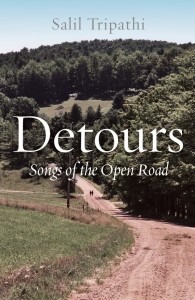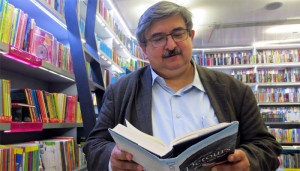Salil Tripathi, “Detours: Songs of the Open Road”
 ( Noted London-based Indian journalist Salil Tripathi’s third book, Detours, is a collection of his column/essays on travel writing. This book is meant to be savoured. I was able to read one, maximum two, essays at a time. There was so much to absorb and appreciate in each essay in terms of the rich cultural experiences, the noises, colour, smells, details about the landscape, socio-political characteristics of the places he visits at that particular time with some history deftly blended in. Every single element seems to have his attention for detail. For instance, each chapter heading is carefully selected, it is appropriate for what follows in the essay but also resonates with the reader at many levels. It is rare to find such craftsmanship in a book today. Salil Tripathi has been a man of letters for some decades giving him immense practice in relying upon words to share, comment, dissect and analyse an experience but he does so without ever being dull. So reading Detours is infinitely pleasurable since not for a second does one miss the lack of photographs, sketches or any other form of illustration to support the travelogue. Just focus on the man and his words. This is armchair tourism at its finest!
( Noted London-based Indian journalist Salil Tripathi’s third book, Detours, is a collection of his column/essays on travel writing. This book is meant to be savoured. I was able to read one, maximum two, essays at a time. There was so much to absorb and appreciate in each essay in terms of the rich cultural experiences, the noises, colour, smells, details about the landscape, socio-political characteristics of the places he visits at that particular time with some history deftly blended in. Every single element seems to have his attention for detail. For instance, each chapter heading is carefully selected, it is appropriate for what follows in the essay but also resonates with the reader at many levels. It is rare to find such craftsmanship in a book today. Salil Tripathi has been a man of letters for some decades giving him immense practice in relying upon words to share, comment, dissect and analyse an experience but he does so without ever being dull. So reading Detours is infinitely pleasurable since not for a second does one miss the lack of photographs, sketches or any other form of illustration to support the travelogue. Just focus on the man and his words. This is armchair tourism at its finest!
I am posting an extract from the introduction reproduced with permission from the publishers.)
As I started working on the essays, I looked back at the great travel writing I had read—Mark Twain, Eric Newby,  Paul Theroux, Ian Buruma, Pico Iyer, and William Dalrymple are among the writers through whose words I began to look at the world differently. I had also read many entertaining accounts, of an American or British writer abroad—like S J Perelman or George Mikes—and enjoyed the tragicomedy that followed. But getting off the beaten track and travelling on roads not taken to reach quieter places seemed so much more enticing. I also read many accounts of the outsider looking in at India, the western gaze trying to make sense of the mysterious east. Mine was an attempt to look at the world through Indian eyes—not as if it was an empire-striking-back, for that would be too presumptuous: how can anyone born in India claim to speak on behalf of a billion people? Rather, mine would be an attempt to look at the world through a sensibility that had been shaped by India and later tinged by other cultures.
Paul Theroux, Ian Buruma, Pico Iyer, and William Dalrymple are among the writers through whose words I began to look at the world differently. I had also read many entertaining accounts, of an American or British writer abroad—like S J Perelman or George Mikes—and enjoyed the tragicomedy that followed. But getting off the beaten track and travelling on roads not taken to reach quieter places seemed so much more enticing. I also read many accounts of the outsider looking in at India, the western gaze trying to make sense of the mysterious east. Mine was an attempt to look at the world through Indian eyes—not as if it was an empire-striking-back, for that would be too presumptuous: how can anyone born in India claim to speak on behalf of a billion people? Rather, mine would be an attempt to look at the world through a sensibility that had been shaped by India and later tinged by other cultures.
I hadn’t left India until 1975 when I was still thirteen, on a tour organised by my school to Nepal. In 1979 I spent a few weeks in Scotland on a student exchange programme. In 1983 I went to the United States to study and returned home in 1986. I moved abroad in 1991, when I left for Singapore, and then in 1999, for England. Each journey affected in some way how I saw the world. My work—as a correspondent first, and later, as a researcher/advocate for human rights organisations—has taken me to fifty-five countries (including India). I’ve learned something new from each visit; I’ve made lasting friendships in many cities and towns around the world. It is impossible to write down each experience. This book attempts to reveal the world I have seen.
The book is divided into three parts: War & After, Words & Images, and Loss & Remembrance. The first section, War & After, deals with places that have been deeply affected by armed conflict or have had human rights challenges—Bogotá, Jakarta, Berlin, Yangon, Mostar, Phnom Penh, Cape Town and Johannesburg, Singapore, Lagos, and Istanbul. In the next section, Words & Images, I write about places that I have understood better because certain writers or artists have made those places more vivid: Bombay (now Mumbai), Amsterdam, Paris, Madrid, Barcelona, Nairobi and Naivasha, Arusha and Kilimanjaro, Granada, Valparaiso and Isla Negra, Kyoto, Srimongol and Shilaidaha, Shanghai, and New York. The third section, Loss & Remembrance, is the most personal; it is, in a sense, about Karuna Sirkar, my wife who died in 2006. I have written about the places I had travelled with her in the two decades we were together, or where I could feel her presence on later visits; or the places where I went with my sons Udayan and Ameya after her passing, as the three of us tried to pick ourselves up to understand the meaning of our shattering loss: Ludlow and Proctersville, Collioure, Geneva, Stockholm, Venice, Beachy Head, Ålesund and Oslo, and San Francisco.
Salil Tripathi Detours: Songs of the Open Road Tranquebar Press, an imprint of Westland Ltd., 2016. Hb. pp. 380. Rs. 695
16 Feb 2016




